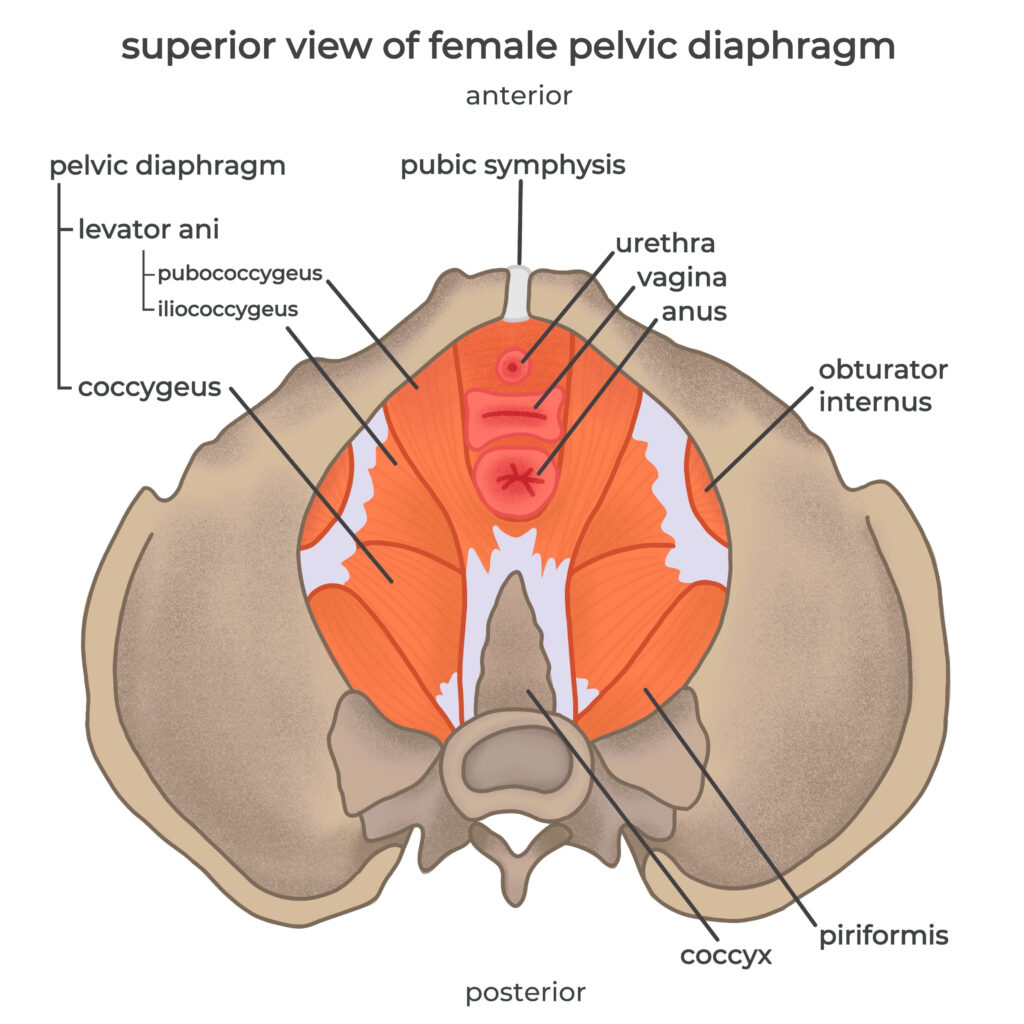“I was becoming desperate for pain relief so I started searching the internet and found Sandra LaBella. I made an appointment to see her and within the first few treatments, my pain subsided for the first time in years. I was amazed... I will forever be grateful for Sandra for helping me find pain relief and giving me my life back ∼Patrick." Sandra LaBella, PT, CWHC, a licensed Physical Therapist for over 18 years and specializing in the field of Pelvic Floor Physical Therapy since 2001.
At Evoke, we offer Pelvic Floor Physical Therapy for both male and female pelvic floor dysfunction (PFD) and pelvic pain. We understand that PFD and surrounding issues of vaginal or rectal pain, pelvic pain, constipation, incontinence or bladder and bowel conditions often go unspoken. We are here to help. Our physical therapists are highly educated and trained in pelvic floor physical therapy and are state licensed professionals. Pelvic floor dysfunction is typically multi-factorial and complex. As an integrated holistic practice offering both pelvic floor and manual orthopedics, we are uniquely suited to treat pelvic floor dysfunction. We look further into other contributing factors and treat the whole person. Our treatments are very specialized to match the integrated approach necessary. If you think you have pelvic floor dysfunction and have questions, please feel free to contact us at our Cary office. If your healthcare providers are unfamiliar with pelvic floor dysfunction, we would be happy to consult with them and coordinate your care. We are here for you!
Pelvic Floor Muscle
 Pelvic floor Physical Therapy can encompass treatment for a variety of disorders related to the pelvic floor muscle, pelvic girdle, vaginal or rectal region and bladder or bowel. The pelvic floor muscle is made up of a number of different layers that span like a hammock at the bottom of the pelvis; attaching at the front of the body at the pubis to the back of the body at the coccyx bone (tailbone). The pelvic floor muscle is a supportive structure of the pelvic organs (uterus, bladder and rectum) and plays a key role in helping to maintain continence, enhance sexual function, facilitate childbirth and assist in core stability and venus and lymphatic pump. As physical therapists, we evaluate musculoskeletal and neuromuscular systems of the body. We treat dysfunction and pain that may include any combination or degree of the following: weakness, tension, short muscle, laxity, myofascial restrictions, trigger point spasm, muscle incoordination, muscle imbalances and body misalignment. Certain pelvic floor conditions can be very painful and debilitating. At times, referral is appropriate in conjunction with physical therapy to properly and effectively provide the best care needed. This may include colorectal, gastroenterology, gynecology, urology, urogynecology, psychology, social work, chiropractic, acupuncture and nutrition.
Pelvic floor Physical Therapy can encompass treatment for a variety of disorders related to the pelvic floor muscle, pelvic girdle, vaginal or rectal region and bladder or bowel. The pelvic floor muscle is made up of a number of different layers that span like a hammock at the bottom of the pelvis; attaching at the front of the body at the pubis to the back of the body at the coccyx bone (tailbone). The pelvic floor muscle is a supportive structure of the pelvic organs (uterus, bladder and rectum) and plays a key role in helping to maintain continence, enhance sexual function, facilitate childbirth and assist in core stability and venus and lymphatic pump. As physical therapists, we evaluate musculoskeletal and neuromuscular systems of the body. We treat dysfunction and pain that may include any combination or degree of the following: weakness, tension, short muscle, laxity, myofascial restrictions, trigger point spasm, muscle incoordination, muscle imbalances and body misalignment. Certain pelvic floor conditions can be very painful and debilitating. At times, referral is appropriate in conjunction with physical therapy to properly and effectively provide the best care needed. This may include colorectal, gastroenterology, gynecology, urology, urogynecology, psychology, social work, chiropractic, acupuncture and nutrition.
Why Pelvic Floor?
 "There are many people suffering from pelvic floor dysfunction (PFD) and pelvic pain. Many more than we know. Many of whom suffer in silence and alone. This can lead to isolation, depression, anxiety and can truly be life altering for the individual and family. I am always passionately driven to help my patients. Being personable and caring, I connect deeply with my patients. They share their personal journey, struggles and pains. I can still remember the patient that shared hers…that day I became interested in pelvic floor physical therapy and began my research and training. To me, the body is logical and expressed pain is speaking a message; you just have to be dedicated to understand it and have the tools to treat it. I feel strongly that we as members of the medical profession have a responsibility and obligation to “make a habit of two things: to help; or at least to do no harm”. Hippocrates. In my beginning years of treating pelvic floor dysfunction, I can recall most of my patients suffered for many years before they were referred; never seeming to get the help they needed. Gladly, most of my patients get referred quickly now. There has been such a tremendous growth of knowledge and awareness in this field, truly demonstrative of a patient's determination and resourcefulness to be well and the caring professionals in support of them. Again, if your healthcare provider is unfamiliar with pelvic floor dysfunction, I would be happy to consult with them and coordinate your care. Below lists the Pelvic Floor Physical Therapy conditions we provide treatment for. This list is not all inclusive. If you have specific questions regarding your condition, please contact our Cary office. " ∼Sandra LaBella, PT, CWHC
"There are many people suffering from pelvic floor dysfunction (PFD) and pelvic pain. Many more than we know. Many of whom suffer in silence and alone. This can lead to isolation, depression, anxiety and can truly be life altering for the individual and family. I am always passionately driven to help my patients. Being personable and caring, I connect deeply with my patients. They share their personal journey, struggles and pains. I can still remember the patient that shared hers…that day I became interested in pelvic floor physical therapy and began my research and training. To me, the body is logical and expressed pain is speaking a message; you just have to be dedicated to understand it and have the tools to treat it. I feel strongly that we as members of the medical profession have a responsibility and obligation to “make a habit of two things: to help; or at least to do no harm”. Hippocrates. In my beginning years of treating pelvic floor dysfunction, I can recall most of my patients suffered for many years before they were referred; never seeming to get the help they needed. Gladly, most of my patients get referred quickly now. There has been such a tremendous growth of knowledge and awareness in this field, truly demonstrative of a patient's determination and resourcefulness to be well and the caring professionals in support of them. Again, if your healthcare provider is unfamiliar with pelvic floor dysfunction, I would be happy to consult with them and coordinate your care. Below lists the Pelvic Floor Physical Therapy conditions we provide treatment for. This list is not all inclusive. If you have specific questions regarding your condition, please contact our Cary office. " ∼Sandra LaBella, PT, CWHC
Pelvic Floor Conditions
- Pelvic Floor Dysfunction
- Chronic Pelvic Pain
- Levator Ani Syndrome
- Constipation
- Vaginismus
- Anismus
- Painful Bladder Syndrome
- Proctalgia Fugax
- Pelvic Floor Laxity
- Prolapse (Bladder, Uterus, Rectum)
- Urinary Incontinence
- Fecal Incontinence
- Urinary Urgency
- Urinary Frequency
- Ineffective Emptying
- Pelvic Congestion
- Prostatitis
- Coccygodynia
- Irritable Bowel Syndrome
- Interstitial Cystitis
- Urethral Syndrome
- Vulvar Vestibulitis
- Vulvodynia
- Pudendal Nerve Pain



